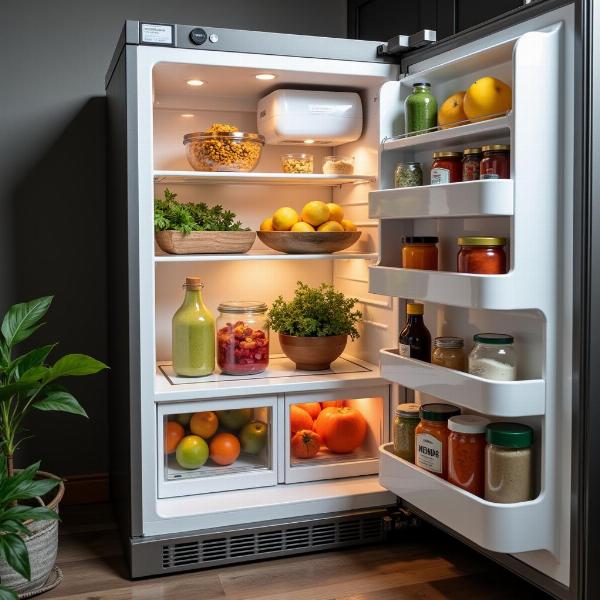Understanding the “do not freeze” instruction, particularly within the Indian context, is crucial for preserving food quality and preventing foodborne illnesses. While seemingly straightforward, this directive can have nuanced meanings depending on the product and its intended use. This article explores the various Hindi translations and cultural implications of “do not freeze,” ensuring you confidently handle food storage and preparation.
Different Ways to Say “Do Not Freeze” in Hindi
There isn’t one single perfect translation for “do not freeze” in Hindi. The most appropriate phrase depends on the context. Here are some common options:
- जमाएँ नहीं (Jamaein nahin): This is a general and widely understood translation, meaning “do not freeze.”
- फ्रीज़ न करें (Freeze na karein): This uses the English word “freeze” transliterated into Hindi script, making it easily recognizable, especially for products with English labeling.
- बर्फ़ न जमाएँ (Barf na jamaein): This translates to “do not freeze ice,” emphasizing the formation of ice crystals. It’s suitable for liquids that might expand and break their containers upon freezing.
- ठंडा करके रखें, जमाएँ नहीं (Thanda karke rakhein, jamaein nahin): This translates to “keep cool, do not freeze,” offering more specific storage instructions.
Why “Do Not Freeze” Matters in the Indian Kitchen
In India, where diverse climates and food habits prevail, understanding food storage instructions is paramount. Freezing certain foods can alter their texture, flavor, and nutritional value. For instance, dairy products like paneer and dahi can become grainy upon freezing and thawing. Similarly, certain vegetables lose their crispness and become mushy. Understanding the “do not freeze” instruction prevents food wastage and maintains the desired culinary experience.
Cultural Nuances and Food Preservation Practices
Traditional Indian cuisine often involves fresh ingredients and daily cooking. Refrigeration is relatively recent, and freezing, while gaining popularity, is still not as ubiquitous as in some Western cultures. This cultural context influences how people interpret and follow food storage instructions. For many, the concept of freezing is associated with long-term preservation, and the “do not freeze” instruction might be overlooked or misunderstood.
 Indian Refrigerator Organization
Indian Refrigerator Organization
Common Products with “Do Not Freeze” Instructions
Several common food items carry the “do not freeze” instruction. These include:
- Dairy products: Milk, yogurt (dahi), paneer, and some cheeses.
- Certain fruits and vegetables: Leafy greens, tomatoes, cucumbers, and some berries.
- Prepared dishes: Some sauces, chutneys, and pre-packaged meals.
- Medications: Certain medicines lose their efficacy when frozen.
What Happens When You Freeze Foods That Shouldn’t Be Frozen?
Freezing unsuitable foods can lead to undesirable outcomes:
- Texture changes: Foods can become mushy, watery, or grainy.
- Flavor loss: Freezing can diminish the natural flavors of certain ingredients.
- Nutrient degradation: Some vitamins and minerals are sensitive to freezing temperatures.
- Packaging damage: Expanding liquids can burst containers.
Conclusion
Understanding the “do not freeze” meaning in Hindi (जमाएँ नहीं, and other variations) is essential for maintaining food quality and safety in Indian households. By paying attention to this instruction and following appropriate storage practices, we can minimize food wastage and enjoy our meals as intended. Remembering the cultural context and the specific reasons behind this directive will help us make informed choices about food preservation.
FAQ
-
What is the most common way to say “do not freeze” in Hindi? The most common way is जमाएँ नहीं (Jamaein nahin).
-
Why shouldn’t I freeze dairy products like dahi? Freezing dahi can alter its texture, making it grainy and less palatable.
-
Is it okay to freeze cooked vegetables? While some cooked vegetables freeze well, others, like leafy greens, become mushy upon thawing.
-
What should I do if I accidentally freeze a “do not freeze” item? It depends on the food item. Some might still be usable, while others might need to be discarded.
-
Where can I find reliable information about food storage in Hindi? You can find helpful resources online and in cookbooks specializing in Indian cuisine.
Introducing Meaning-Hindi.in
Meaning-Hindi.in is your trusted partner for all your Hindi translation needs. We offer a range of services, from business and legal document translation to technical and website localization. Our team of expert linguists ensures accurate and culturally sensitive translations, bridging the language gap for individuals and businesses alike. We also specialize in educational and academic translations, helping students and researchers access valuable information in Hindi. For accurate and reliable Hindi translations, contact us at [email protected] or call us at +91 11-4502-7584. Meaning-Hindi.in is committed to delivering high-quality language solutions tailored to your specific requirements.